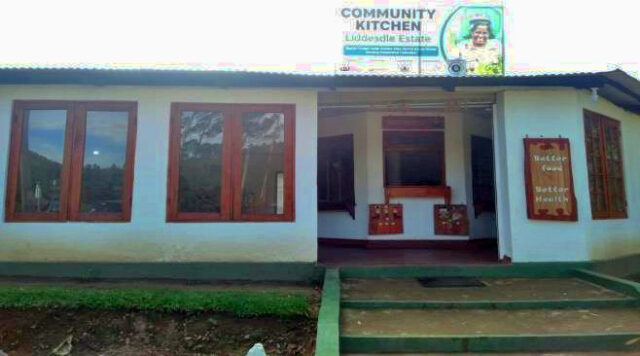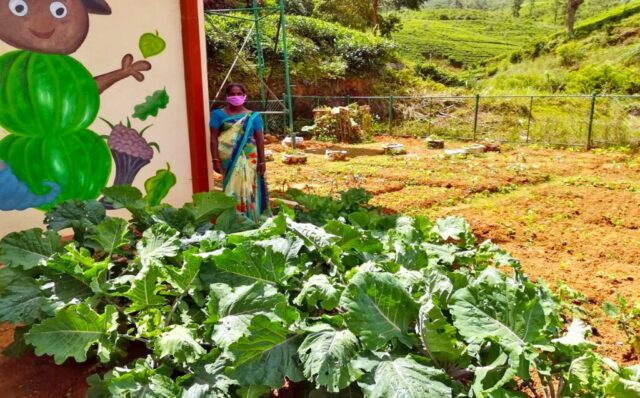
5th July 2021: With the pandemic taking a toll across many vulnerable communities in Sri Lanka, the Planters’ Association of Ceylon (PA) reiterated the commitment of its members in ensuring the quality of health and living of estate sector communities.
Working towards this vital goal, the industry has set a collective target of reducing child malnutrition by 10% by the end of 2021, through the implementation of 60 nutrition enhancement projects across RPC Estates.
Championed by the Plantation Human Development Trust (PHDT), a tripartite organization consisting of Regional Plantation Companies (RPCs), the government, and trade unions, several projects are currently underway to address serious concerns around low levels of nutrition and prevalence of anemia within the estate population.
While massive improvements have been made across several key health indicators, according to the most recent Demographic and Health Survey (2016) carried out by the Department of Census and Statistics, the estate sector continues to record some of the lowest height-for-age and weight-for-age levels in children below the age of 5 in Sri Lanka. Similarly, the prevalence of underweight children in the estate sector is 26.6%, considerably higher than their counterparts in rural and urban sectors – 21% and 16% respectively.

“We recognize and are deeply concerned by the history of health and nutrition issues in the estate sector. We’re committed to making sure that the plantation workers on our estates are able to lead healthier lives and have access to better facilities than their predecessors, no matter the cost,”
“Through our direct experiences and our work with the PHDT, we know that a large part of this issue is the dietary culture in the estate sector – workers are reluctant to have protein-rich meals and are usually iron-deficient. Thus, we’re committed to educating all our employees on the nutritional value of different foods while also providing them with regular balanced meals. A skilled and healthy community, working at optimum capacity, is a source of strength for any country,” stated PA spokesperson Dr. Roshan Rajadurai.
Understanding that managing nutritional issues in the estate sector requires a holistic approach, PHDT set out to address problems with the sector’s ingrained dietary culture. According to PHD, religious and cultural sensitivities and taboos dissuade workers from consuming sufficient amounts of protein and eggs, which contributes significantly to malnutrition in the sector.
In response to these pressing health concerns, PHDT initiated 8 ‘community kitchens’, where workers and even the public have access to nutritious, hygienically prepared, and low-priced meals. Highly skilled nutritionists are hired as advisers, and design meal plans especially catered towards plantation workers’ unique dietary requirements. Following this, workers are given the authority to prepare the meals, which they can also sell to members of the wider community at concessionary rates.

“We’re delighted by the initial success of our Community Kitchens, which we’ve already launched in 6 estates. We look forward to expanding this project in years to come. Beyond providing workers with healthy and affordable meals, the community kitchen concept also fosters a real sense of community and belonging among the workers, and encourages them to take a more control over their own wellbeing,” stated Dr. Rajadurai.
In addition, PHDT has encouraged workers to begin their own poultry and organic food cultivation, including protein-rich food sources like mushrooms, in an effort to boost protein consumption and iron absorption among workers. These home gardening projects also enable workers to sell their surplus produce, and thus acts as a means of income supplementation which improves their overall quality of life.
A Water and Sanitation Project in partnership with the World Bank was launched to improve access to safe drinking water. The project provides around 15,000 families, of approximately 60,000 people, with access to safe drinking water through 40 mega projects in selected estates.
“By addressing the root causes of the sector’s malnutrition issues, we’re already seeing the positive impact of this investment. In particular, the reported incidence of diarrheal disease has fallen dramatically since commencing the water and sanitation projects. With further collaboration, all plantation workers will have equal access to nourishment and equitable healthcare as the rest of the country does,” PHDT Director Health, Dr. Gunesekera commented.



